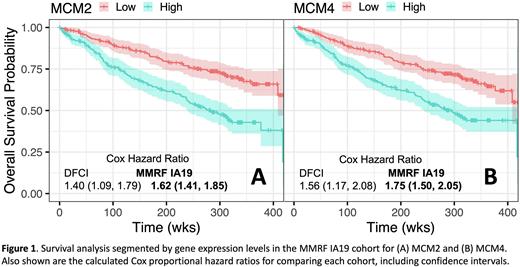Abstract
The minichromosome maintenance (MCM) complex is among the best-known protein families involved in eukaryotic replication initiation. The six conserved proteins of the MCM complex, namely MCM2-MCM7, have been well studied and form a DNA helicase. Dysregulation of members of the MCM complex has been demonstrated in multiple cancer types, including gastric cancer, liver cancer, cervical cancer, and prostate cancer, among others. However, comparatively little is currently known about the role of the MCM complex in hematological oncology. We show here the first evidence of a causal link between members of the MCM complex, specifically MCM2, MCM3, and MCM4, and overall survival of multiple myeloma patients. This result was further validated in a separate, externally collected cohort of patients.
In this study, an in-silico patient model of Multiple Myeloma Research Foundation (MMRF) IA19 CoMMpass data was developed using GNS Healthcare's Causal AI technology, REFSTM. REFSTM has been previously used to analyze MMRF data to identify the epigenetic regulator PHF19 as a marker of aggressive disease. Simulated genetic perturbations performed on the in-silico model identified changes in the expression of DNA replication genes MCM2, MCM3, and MCM4 as strong causal drivers of overall survival (OS) in MM patients (MCM2 and MCM4 shown in figure 1). These targets were validated using a Cox proportional-hazards model on an out-of-cohort Dana-Farber Cancer Institute MM dataset (DFCI). We report Cox hazard ratios of 1.62 (1.41, 1.85), 1.72 (1.42, 2.10), and 1.75 (1.50, 2.05) respectively, for MCM2, MCM3 and MCM4 in the MMRF IA19 dataset. Among patients in the DFCI dataset, we report Cox hazard ratios of 1.40 (1.09, 1.79), 1.50 (1.14, 1.99), and 1.56 (1.17, 2.08), respectively for MCM2, MCM3 and MCM4. In addition, causal modeling indicated large negative prognostic median effect sizes for overall survival.
In summary, this work demonstrates MCM2, MCM3, and MCM4 as candidate genes involved in MM pathology. These genes are known targets in other cancers due to their role in DNA replication and cell cycle pathways. We could not identify any existing Open Targets literature related to these genes as drug targets or predictive markers in MM. Our results, validated out-of-cohort, suggest that MCM2, MCM3, and MCM4 are newly discovered predictors of overall survival among multiple myeloma patients.
Disclosures
No relevant conflicts of interest to declare.
Author notes
Asterisk with author names denotes non-ASH members.


This feature is available to Subscribers Only
Sign In or Create an Account Close Modal